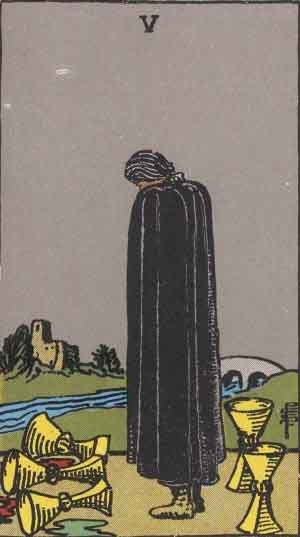
I’ve had a lot of loss over the years. Most recently, two longtime friends passed away. One from a long, complicated illness and the other from an overdose. I’m still haunted from the latter to this day even though it’s been three years.
Because you see, grief doesn’t happen in a neat little package with stages. Sometimes you never really “get over it.” You can’t. And guess what: that’s okay.
This is the topic of a powerful new book by Megan Devine called It’s Okay That You’re Not Okay: Meeting Grief and Loss in a Culture that Doesn’t Understand. This book offers a profound and honest look at the grieving process – and has tips, practices, and stories to help aid in healing after loss. (My favorite chapter is Rallying Your Support Team, which has the most excellent advice for helping a loved one deal with grief.)
Megan sat down with me recently to talk about grieving – and the Five of Cups, tarot’s saddest card in the deck.
Q: What is the biggest misconception about grieving?
Megan: The biggest misconception about grieving is that it’s this unfortunate, temporary thing that you’re supposed to move through quickly and put it all behind you. That single misconception leaves grieving people feeling dismissed or unsupported, and leaves support people feeling frustrated and helpless in the face of grief that “lasts too long.”
Q: Our culture seems to have a fear around discussing grief. How can we get past that?
Megan: We definitely have a fear of discussing grief. There’s great stuff coming out of the Death Positive movement to help us open end of life conversations, but I think we’re actually far more afraid of grief than we are of death. We’re afraid of having to live without the people we love. Afraid of having to say goodbye before we’re ready. Afraid we’ll start crying and never be able to stop. And if we see someone else grieving, we want them to get through it as soon as possible, because we want to believe we’d bounce back quickly if something awful or sad happened to us. So how do we get past that fear? By being brave. By starting to talk about it. By being willing to tell the truth about our own experiences with grief, and being willing to hear other peoples’ truth. Really, it’s the same way we get better at any difficult discussion: bravery, and practice.
Q:When someone is grieving, loved ones often become paralyzed, fearful of saying or doing the wrong thing. What is your advice for a loved one who wants to help but feels awkward?
Megan: Feeling awkward is okay! In fact, feeling awkward about it is a great sign – it means you’re moving into new territory. Grieving people would much rather have you stumble through your love and support than confidently assert that things are not as bad as they seem. The one thing to remember is to not try to fix what is unfixable. Your job as a support person is not to take away the person’s pain – that’s not possible. Your job is to companion them inside their pain. That distinction makes all the difference.
Q:. What is the best, healthiest way to move through the grieving process?
Megan: What’s best and healthiest for one person isn’t what’s best and healthiest for another – and that’s the best way to think about the grieving process. I’ll always direct people back to their own sovereignty, their own capacity to decide what feels right and true to them, what feels like honoring their own pain, and their own process. That said, over-indulging in drugs, alcohol, or activities that put your body and mind at risk aren’t a good choice. Harming other people – also not a good choice. Outside of those things, listening for your own needs as grief shifts and changes (sometimes day to day, sometimes hour to hour) is a great, healthy practice.
Q: Is it possible that there are some losses that you might never get over? If that is the case, is that necessarily a bad or unhealthy thing?
Megan: Some losses you never get over – absolutely. Grief doesn’t have an endpoint. I often say that your grief will last as long as your love does. And that’s not a bad thing. We tend to think of grief as this finite, temporary thing, as though still feeling sad, still missing the person who’s died 3 years later, 10 years later, 29 years later is a weird aberration. We all carry grief. It’s in not tending it, not acknowledging this as a healthy, normal thing that most of us do anyway, that’s unhealthy. Sometimes doctors and other providers ask, “what about someone who has been coming into my office for 15 years, complaining of grief?” Well, I say that’s a person who hasn’t yet felt heard. Grief is just a reality. It’s not good or bad. It’s not healthy or unhealthy. It’s a reality of being alive in a world where those we love die.

Q: The Five of Cups is the traditional tarot card for grieving. What advice would you give the figure in this card?
Megan: I probably have a different response to the Five of Cups than is typical. In a typical reading of this card, the figure is seen as focusing on the spilled cups, not seeing the 2 that remain; in a way, it’s a card of failure – a refusal to focus on the “good that remains,” a failure to appreciate what’s left. I don’t see it that way anymore. That some good still remains does not negate the loss. Spilled cups and full cups can – and do – co-exist. They don’t cancel each other out. Maybe it’s not time to turn away. Maybe it’s not time to take that journey back to castle, back to the wider community. It’s okay. If that’s you, in that card, in your reading, maybe I’d ask how it feels to be there. Maybe I’d ask – what do you want and need for yourself, as you stand here, gazing at what is lost? Again, I circle back to sovereignty, and the strength of your own experience. It’s not wrong to gaze at what is lost. Asking yourself what is most true, most needed, most kind, given what has been lost – that’s the story I’d tell with that card.
Megan’s bio:
Megan Devine is on a mission to help people love each other better.
A Pacific Northwest writer, speaker, and grief advocate, she is the founder of Refuge In Grief, a hub of grief education and outreach, where she leads people through some of the most devastating times of their lives. Together with her team, she facilitates a growing catalog of courses, events, and trainings to help grieving people, and those who wish to support them, learn the skills they need to carry pain that cannot be fixed.
Megan is the author of the new book, It’s OK That You’re Not OK: Meeting Grief & Loss in a Culture that Doesn’t Understand. She has been featured widely in the media, including Huffington Post, Modern Loss, and The Manifest-Station, and in dozens of podcasts and radio appearances
Big thank you to Megan for taking time to visit with me. Her work is so, so important. If you’re grieving or know someone who is, you need to follow her work. Please grab a copy of her book, It’s Okay That You’re Not Okay. You can learn more about Megan and her programs over at Refuge in Grief.
Blessings,
Theresa
© Theresa Reed | The Tarot Lady 2017
image from Megan Devine

 I’m Theresa Reed (aka, The Tarot Lady). I’ve been a full-time tarot reader for 30+ years — which, in my industry, makes me pretty badass.
I’m definitely not your average Tarot expert — I drop the F-bomb, I quote rappers, and I’m obsessed with pop culture. Folks come to me for straight-talk + tough-love — without the woo-woo fluff.
I’m Theresa Reed (aka, The Tarot Lady). I’ve been a full-time tarot reader for 30+ years — which, in my industry, makes me pretty badass.
I’m definitely not your average Tarot expert — I drop the F-bomb, I quote rappers, and I’m obsessed with pop culture. Folks come to me for straight-talk + tough-love — without the woo-woo fluff.
You must be logged in to post a comment.